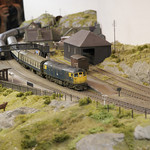Patrick Crozier of Transport Blog describes how he’d run a railway. I’m not sure about this bit:
So, tickets and stations. Al Gore said “Every vote must be counted.” I say “Every ticket must be checked.” At the start and end of every journey. It is not simply a matter of preventing fare evasion. Manned stations show that you care about your property and passengers. They also have a role to play in curbing crime and other forms of anti-social behaviour. If I cannot staff a station (even temporarily) then I will not stop at it. If it means asking passengers to get off at a nearby station and putting them in taxis, so be it. If there is a station that proves persistently difficult to staff then I will close it down.
I can’t imagine CrozierRail operating anything outside major conurbations like that. While staffing every station at all times is ideal, in my book an unstaffed station is better than no station. Dumping passengers at the previous stop and sending them in taxis is the sort of nonsense Virgin Trains is rightly castigated for. And I personally find “open stations” where you don’t have to queue at a ticket barrier a far more pleasant passenger environment.
Checking tickets is another matter, but it’s possible to do that on board the train. It’s something some operators seem to be able to do perfectly well, even if others, such as Thames Trains, can’t be bothered.
As for having a staff presence at lesser-used stations, perhaps CrozierRail (or for that matter any real train companies) should look at what happens in Switzerland. I’ve seen some little-used local stations where you buy tickets from the conductor on the train with well-maintained buildings complete with hanging baskets full of flowers! How do they manage this? By renting the station houses to retired railwaymen. The ultimate example of this was Blausee-Mitholz on the BLS between Frutigen and Kandersteg; the station is still immaculately-maintained even though no trains stop there!


